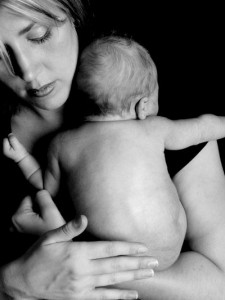How crazy does this sound? My children were both in their teens before I realized that I had experienced postpartum depression with both of them. What led to this tardy epiphany? Not the several years of deep therapeutic work with two different therapists and a variety of bodyworkers; not the many years of deep scholarly work pursuing my doctorate in early human development, including the study of pregnancy, birth and postpartum issues; and as you can probably guess, not from my own OB/GYN.
I have Brooke Shields to thank for my big ah-hah. In her 2006 self-portrait of postpartum depression, Down Came the Rain, she articulated in a raw, immediate way the terrifying, alienating, embarrassing, confusing — and most of all, countercultural — feelings and impulses that attend postpartum depression:
postpartum depression, Down Came the Rain, she articulated in a raw, immediate way the terrifying, alienating, embarrassing, confusing — and most of all, countercultural — feelings and impulses that attend postpartum depression:
I feel like a fraud. People keep saying, Aren’t you just thrilled to be a mother? You must be so in love! What a blessing. All I can do is smile and say, “It’s crazy.”
The thought of being the only person to care for her terrified me. She seemed pure and honest and raw, and it unsettled me. Her helplessness terrified me.
These other moms didn’t appear to want to be anywhere else, and seemed at peace. Motherhood agreed with all of them. What in the hell is wrong with me?? Why can’t I be happy??
There it was — my secret history, vividly reanimated, a second chance for me to recognize it for what it was. I’ve now come to call it Chronic Covert Postpartum Depression (CCPD), and many women experience it. They suffer behind a façade of frantic perfectionism that effectively obscures the very possibility that there might be anything wrong. So information about or consideration of postpartum depression doesn’t even make it onto their radar screens. Many years before research turned up perfectionism as a risk factor for postpartum depression, I wrote an article about my struggles with perfecting new motherhood; it was clear that even ten years out, I still wasn’t recognizing those struggles as CCPD. I described my
vague but persistent fears of incompetence, an intangible but relentless drive running deep inside me to always be trying to do it better, or at least do it right. Do what right, I couldn’t define. I just knew that I rarely felt a respite from this steady pressure that seemed to define
my life after becoming a mother. And it seemed that I was angry, silently resentful, most of the time.
When there were no specific tasks to accomplish, like diapering or feeding or driving us somewhere, I felt deep discomfort at simply being with my baby. As soon as I would sit down on the family room carpet with my baby, to just be there while he explored and played, the resistance would rise up and I would quell it by suddenly thinking, Oh, I’ve got to jump up right now and call about those slipcovers, or Maybe I should plan tomorrow’s dinner, or I’d better go wipe the water spots off that table. The refuge of life’s droning busywork.
We had planned for Ian to sleep in a cradle in our room during the early weeks, but on our first night home his snuffling baby noises kept me so on edge, his closeness so chafed at me, that he was alone in his own room beginning the following night. Then I could feel tense and guilty from safely down the hall.
A new study on postpartum depressive symptoms finds that I was a walking bundle of risk factors: I had an established career, clear expectations of parenthood, and a high need for control. Indeed. While inside I struggled, outside I strained to present a status-quo face. I wore J. Crew, prepared organic baby food, went to Mommy & Me, clenched my teeth, and tried to keep it together. I was living what Clarissa Pinkola Estés calls the grinning depression. My mounting inner conflict made me feel like an alien in a world of seemingly happy mothers-who-adored-mothering.
A few years later with my second baby, my daughter, things were so much better. I felt like queen of the world after a great pregnancy, an empowering birth, and several months of blissful breastfeeding. But all that changed after my beloved aunt Edie died; it was as if a switch was flipped and I slipped back into… that zombie-Mommy place. One of the snapshots that sticks in my mind, and heart, is me on the family room sofa, too fatigued and apathetic to move, and Eve, by then three or so, tugging at me to join her in sunny life. She declared earnestly, “Mommies s’ould pway wif dayow widdul goouhls.” (Translation for those not fluent in threes-ese: “Mommies should play with their little girls.”)
How many playful moments did I miss with my little girl? How many sunny giggles and cuddles were sucked into that beige hole of CCPD? And how many strands of her secure connection with me? And what about Ian and his earliest months… all those months?
 That’s what troubles social worker Kate Kripke about these “middle women” on the PPD spectrum, the ones who tend to slip through the diagnostic net because of their outward patina of functionality. “We can certainly help to strengthen attachments between these moms and their babies and support the relationships that have been troubled by the months before their desperate calls, but we can’t take away the lost moments. And this can be heartbreaking.”
That’s what troubles social worker Kate Kripke about these “middle women” on the PPD spectrum, the ones who tend to slip through the diagnostic net because of their outward patina of functionality. “We can certainly help to strengthen attachments between these moms and their babies and support the relationships that have been troubled by the months before their desperate calls, but we can’t take away the lost moments. And this can be heartbreaking.”
I find a touching circularity in Eve (now 21) alerting me to (her favorite blogger) Joanna Goddard’s post last month detailing her experience with maternal depressive symptoms, during which Goddard was overwhelmed, hopeless and exhausted. I asked Eve if she remembers me being like that. She said no. She was surprised when I described the sofa incident.
So, not just moments but memories slipped away into that beige hole.
Sources
Pearson, Catherine. “Weaning and depression linked in many women.” HuffPost Parents. 2/27/12
Rettner, Rachael. “Perfectionists at Risk for Postpartum Depression.” LiveScience.com. 7/6/10
www.news-medical.net. Study identifies risk factors for postpartum depressive symptoms. 3/22/12
Kripke, Kate. “To the postpartum depression moms suffering in silence.” Postpartum Progress. 3/20/12
Goddard, Joanna. “The hardest two months of my life.” A Cup of Jo, 2/20/12.
Images
Brooke Shields, cover image from Down Came The Rain
Marcy and Ian Axness, by John Axness
Mother and baby, by Lisa Pflaum used with permission
________________
Marcy Axness, PhD, is the author of Parenting for Peace: Raising the Next Generation of Peacemakers.
Tags: Brooke Shields, CCPD, postpartum depression, PPD, presence


